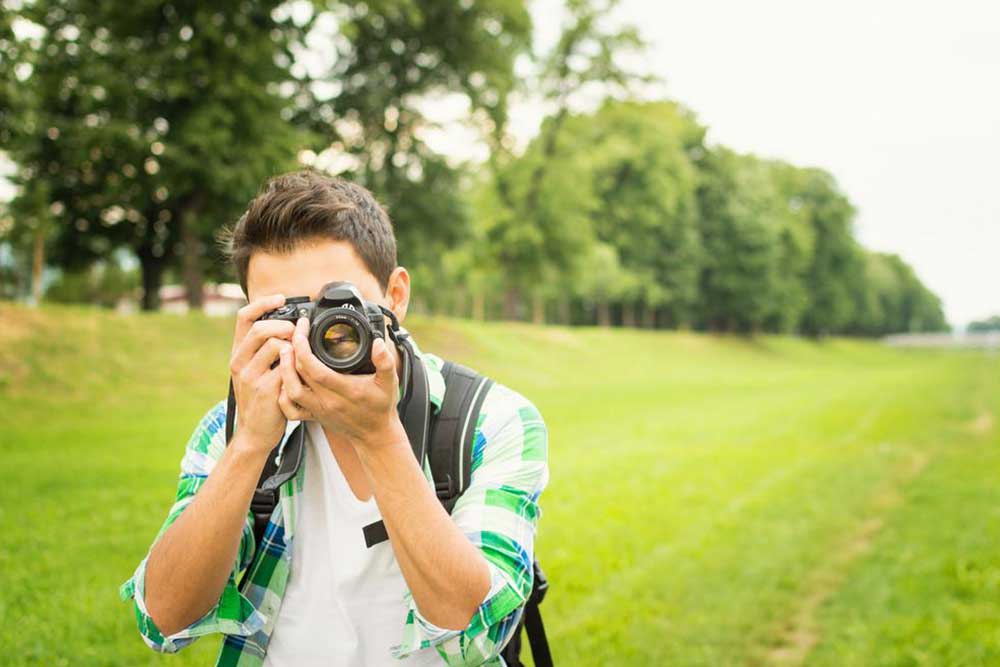5 Essential Digital Photography Tips for Beginners

A great photograph is a work of art. With the advent of digital photography, clicking and developing photos has become simple and easy. However, if you have just got your hands on a brand new DSLR, photography could seem like a daunting task. Don’t worry. Here are five essential digital photography tips to get you started.
- Follow the “Rule of Thirds”
One of the basic tenets of photography, the “Rule of Thirds” concept states that ideally, the subject of your image should never be in the exact center of the frame.
Rather, you should picture two horizontal and vertical lines dividing the frame. The point of intersection of these lines is where your subject should appear. According to the “Rule of Thirds,” this is the best way to focus attention on your subject. Learn about the “Exposure Triangle”
The “Exposure Triangle” consists of the interrelationship between the aperture, shutter speed, and ISO settings in photography. Understanding this basic principle will help you shoot brilliant images effortlessly in different lighting conditions. It will also help you experiment with photography as an art form. However, mastering this technique will require a great deal of practice. Shoot in RAW
Before you start clicking photos, go to your camera settings and change the type of file shot from JPEG to RAW. Why should one choose the RAW format? RAW is a type of file format that is best at capturing all the data as seen by your lenses. Thus, your photograph has more details, and you also get greater control while editing images. Moreover, most leading digital photography professionals prefer using the RAW format to click splendid shots. Try out different lenses
If you are a beginner at photography, there are high chances that you still have the standard 18-55mm kit lens. If you want to improve your shots, experiment with different types of lenses. Go for a telephoto lens with higher zoom quality, a prime lens, a wide-angle lens, or even a razor-sharp macro lens. Your creativity will bloom when you start experimenting. Never use flash indoors
Indoor photography works best with natural lighting. So, don’t hesitate to turn off that flash, bump up the ISO to around 800 or slightly more, and use your widest aperture. The era of digital photography has made it easy to shoot with natural light. You can instantly see your shots on the camera’s LCD monitor.
The “Exposure Triangle” consists of the interrelationship between the aperture, shutter speed, and ISO settings in photography. Understanding this basic principle will help you shoot brilliant images effortlessly in different lighting conditions. It will also help you experiment with photography as an art form. However, mastering this technique will require a great deal of practice.
Before you start clicking photos, go to your camera settings and change the type of file shot from JPEG to RAW. Why should one choose the RAW format? RAW is a type of file format that is best at capturing all the data as seen by your lenses. Thus, your photograph has more details, and you also get greater control while editing images. Moreover, most leading digital photography professionals prefer using the RAW format to click splendid shots.
If you are a beginner at photography, there are high chances that you still have the standard 18-55mm kit lens. If you want to improve your shots, experiment with different types of lenses. Go for a telephoto lens with higher zoom quality, a prime lens, a wide-angle lens, or even a razor-sharp macro lens. Your creativity will bloom when you start experimenting.
Indoor photography works best with natural lighting. So, don’t hesitate to turn off that flash, bump up the ISO to around 800 or slightly more, and use your widest aperture. The era of digital photography has made it easy to shoot with natural light. You can instantly see your shots on the camera’s LCD monitor.
Disclaimer:
The content provided on our blog site traverses numerous categories, offering readers valuable and practical information. Readers can use the editorial team’s research and data to gain more insights into their topics of interest. However, they are requested not to treat the articles as conclusive. The website team cannot be held responsible for differences in data or inaccuracies found across other platforms. Please also note that the site might also miss out on various schemes and offers available that the readers may find more beneficial than the ones we cover.

